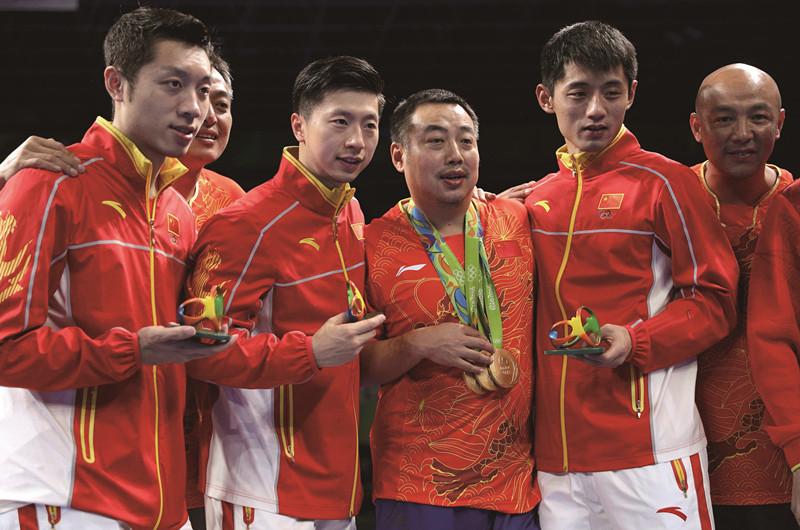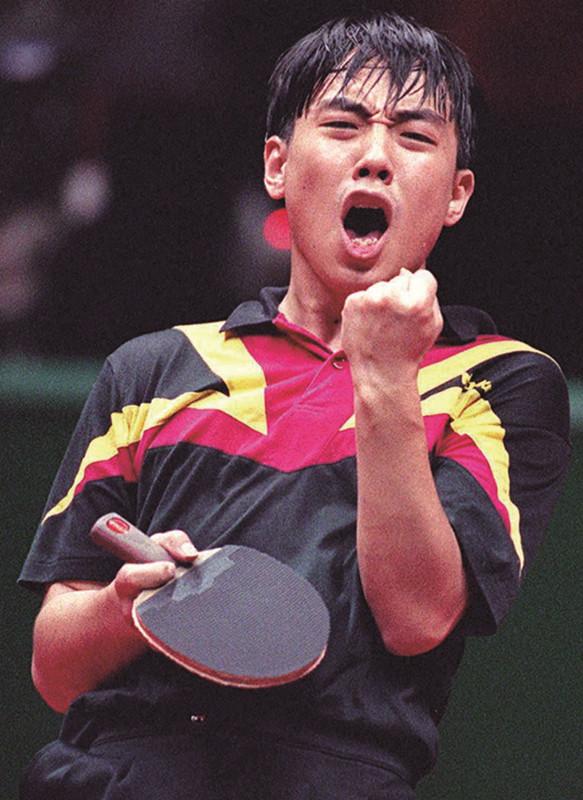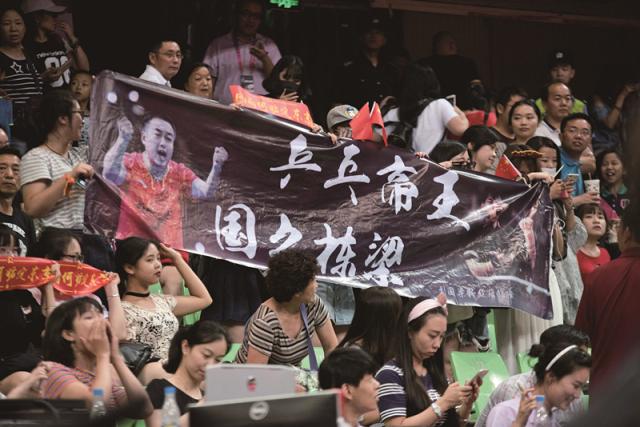
 Old Version
Old Version
Table Tennis Coach Dismissal
“We have no heart for games, we just miss you, Liu Guoliang,” several Chinese table tennis players and coaches simultaneously tweeted on Sina Weibo, the Chinese equivalent of Twitter, on the night of June 23. Just three days previously, their head coach Liu Guoliang was dismissed and transferred to an allegedly nominal post, that of 19th deputy chairman of the Chinese Table Tennis Association (CTTA), China’s highest non-governmental table tennis management organization, under the General Administration of Sport (GAS) of China, without any credible reason given.
According to the CTTA, Liu’s transfer was a part of its management reform to cut personnel and increase efficiency. Netizens questioned why Liu, a national player and coach with a brilliant track record who was leading the national team to new heights, was sidelined.
To protest the sudden transfer, three national-level ping pong players and two coaches withdrew from the ongoing China Open on June 23, followed by more players and coaches joining the protest via Weibo.
The CTTA and GAS, however, remained silent in the face of people’s demands for the detailed reasons of the reform, but rather condemned the players’ withdrawal as individualism and indifference toward the country’s interests.
On June 27, Liu himself wrote a long message on Weibo, claiming that he supports the reform and that he should bear the responsibility for the walkouts of his players. But this was seen as his surrender to the powers that be. Although the CTTA claimed in its statement that the new post will help Liu play a bigger role in table tennis at the national level, the public, constantly shut off from any information by the government, is increasingly distrusting of the reform.
As a former first-tier national player and the first in China to win a triple gold at the Olympic Games, the World Championships and the World Cup, Liu Guoliang was appointed chief coach of the Chinese men’s ping pong team in 2003 when he was only 27 years old. During his tenure as the chief coach, and later the head coach of the overall national ping pong team for men and women. Liu initiated what the media called “the third wave of ping pong,” trying to expand ping pong’s influence by participating in various activities, both commercial and governmental.
Although his new idea sparked some controversies, with some blaming him for “running irrelevant businesses,” Liu’s achievements were dazzling enough to refute his critics. Under his lead, the Chinese table tennis team won a great haul of medals at various international fixtures and swept up all the gold medals for table tennis at the 2016 Rio Olympic Games.
Thanks to his efforts on and “under the table” in managing other aspects of the sport, Liu and his favorite apprentices have become popular sport stars among a growing number of netizens.
Many fans exclaimed that Liu was a remarkable coach, excelling in promoting the sport as well as training young players.
Following the Rio Olympic Games, Liu and his teams, both the men’s and women’s, have been busy with international competitions in order to be, as he claimed, well prepared for the 2020 Tokyo Olympic Games. Nobody would have imagined that he would be relieved of his office at this juncture. An unnamed insider told the media that Liu himself did not know about the transfer until the night of June 19, just as he returned from an international competition.
The CTTA, however, refused to reveal any of the hoped for details, but claimed that they were “reforming the management personnel” by replacing individual coaches with coaching teams in which several coaches jointly manage both the men’s and women’s teams.
“During our investigation into [chief coach of the national women’s table tennis team] Kong Linghui’s [alleged] involvement in a lawsuit involving gambling debt in Hong Kong, we found deep faults in the existing management system… We have now decided to cancel the posts of chief coach and head coach and set up coaching teams instead, which are respectively in charge of competitions and team management… The reform aims to reduce the management personnel and increase efficiency,” said the CTTA’s statement published on June 24.
The national ping pong team was not the only one to be “reformed.” For example, Li Yongbo, former head coach of the Chinese badminton team and former deputy director of the Badminton and Table Tennis Management Center (BTTMC), a governmental unit under the GAS that provides the overall guidance of the management of badminton and table tennis, was recently dismissed from both posts and transferred to be a deputy chairman of the China Badminton Association. Netizens believed it was largely related to the Chinese badminton team’s dissatisfying performance at the Rio Olympic Games, but Liu’s case was different, they argued.
Given Liu’s achievements, people thought that he would have been promoted to deputy director of the governmental BTTMC where Li Yongbo had worked. Liu’s predecessor, Cai Zhenhua, who now serves as the deputy director for GAS, also worked at the BTTMC before. However, Liu was only transferred to a deputy chairman of the non-governmental CTTA and has not yet been given any specific job. People are concerned that Liu will no longer be involved in the management of national-level ping pong, let alone lead it.
The transfer issue continued to ferment on June 23, before the statement, when two coaches and three players – the world-famous top-seeds Ma Long, Fan Zhendong and Xu Xin – announced they were abandoning the China Open, in which they were already participating. The same day, more players and coaches joined the protest by tweeting from their individual Weibo accounts that they “miss Liu Guoliang” and “have no heart for games.” All such comments were tweeted at the same time and using the same wording.
Such a bold and uniform protest amplified people’s doubts over Liu’s transfer. Guo Bin, husband of former national table tennis player Wang Nan and a close friend of Liu’s, shared on his Weibo that the Chinese ping pong teams implemented a similar joint coach system in the end of the 1990s, which did not lead the teams to victory. After the men’s and women’s both lost the doubles in the 2002 Asian Games, the joint coach teams were dismissed, with Liu taking over the men’s team. Guo questioned why the CTTA had resumed the fruitless joint coach system and kicked Liu out.
“You [Liu Guoliang] are young and strong, and at the peak of your career, but now you are being toyed with… What they torment is not you, but the national sport,” tweeted Guo Bin on June 20. Over 27,000 netizens “liked” his post.
Similar to Guo, some media reports and commentators questioned whether the CTTA was “killing the donkey the moment it leaves the millstone.” They took former women’s volleyball chief coach Chen Zhonghe and former men’s basketball chief coach Gong Luming as examples, revealing that when Chen and Gong left, similar doubts were raised and the GAS was often criticized for making “hard-to-understand” rearrangements. Now, people asked if Liu’s achievements had triggered any jealousy in a leader or leaders, or if Liu had fallen victim to an infight.

Liu Guoliang wins the World Cup champion in Nimes, October 27, 1996
Opaque
Neither the CTTA nor the GAS has given any answer. On the contrary, they came out to denounce the withdrawal by players and coaches as ignoring the team and the country’s interests.
“It is a violation of professional ethics and disrespectful to both the spectators and rivals to quit the competition… We demand all teams and athletes hold collectivism and patriotism as top priorities,” read a statement from the GAS following the walk out of the three players. The CTTA made a similar criticism and claimed that it would punish the players and coaches involved.
The official criticism pushed more netizens to stand on Liu’s side. “No, we spectators do not think that the [players who have quit the tournament] have let us down. Instead, you [the GAS] should apologize for discharging our admired coach,” and “Is it patriotic that officials arbitrarily manage the sports regardless of the public’s appeals?” were two of the most re-tweeted posts supporting Liu and the protesting players. Even the small number of people who wondered whether Liu, who often sparked controversy by making no secret of his luxurious lifestyle, had been involved in corruption or should bear some responsibility for his subordinate Kong Linghui’s alleged violation of discipline, believed that no matter whether Liu’s transfer was “reasonable” or not, they have the right to know what had really happened.
“Chinese sports are owned by the entire people and supported by people’s taxes. The tax is not paid for the officials to play power games… We need to know the truth, not merely a simple punishment,” said a commentary published on wggyt, a public account on WeChat which was widely re-posted by many other media.
The officials, however, tried to hush the issue as soon as possible. Netizens found that many of the tweets and articles supporting Liu or questioning the transfer were deleted from social media. Guo Bin also revealed that the national ping pong teams were forbidden to comment on Liu’s transfer and even banned from using Weibo for the hour before the transfer order was released. Guo’s words were confirmed by media outlets which revealed that their journalists were asked not to ask any questions about Liu’s transfer when they were reporting on the ongoing China Open.
On June 24, the Chinese table tennis team posted an open letter on the CTTA’s official website, apologizing for the three players and two coaches quitting the China Open. All the players and coaches who had walked out re-tweeted the apology statement on their Weibo accounts. Three days later, Liu Guoliang posted a long Weibo message, saying that he supports the reform and apologized for his players’ withdrawal.
“I firmly support President Xi Jinping’s guidance and instructions on reform and believe that China will become stronger under his leadership… Reform is a must for Chinese sports and there are indeed many faults in the existing management system… I will not hinder the reform to keep my position,” Liu wrote.
“As a [former] head coach, I should be responsible for my players’ withdrawal. It proved that I had done a bad job in terms of their moral education and management,” he added.
The heavy official tone of the statement is believed to be far from Liu’s ordinary style – Liu once told CCTV, the national TV network, that he wanted to be neither an official nor a politician.
People alleged that this statement was Liu’s surrender to power, or that he and the protesting players and coaches might even be kept away from national table tennis circles if they did not apologize.
But no official statement has followed, leaving this as just speculation. On June 24, Hao Jinsong, who is well-known for frequently suing government departments to urge them to publicize information, wrote an open letter to the GAS, demanding it disclose the details of the transfer.
“Liu’s work contract has not expired at the time he was relieved of his post, so his role as head coach of the national table tennis team is protected by law… and the GAS, as the governmental management department for table tennis, has the legal duty to tell the truth to the public,” read the open letter. “According to China’s Regulation on Government Information Disclosure, I, a ping pong fan, apply to the GAS to disclose related information and to give me a written reply within the statutory time limit. Otherwise I will file an administrative request,” he added.
The public got no reply from the GAS so far, but was soon knocked sideways by a subsequent piece of news: on June 29 it was announced that the Chinese men’s ping pong team will withdraw from the upcoming Australian Open – a decision made by the CTTA. Although the statement from the CTTA claimed that the withdrawal was due to players’ “over-fatigue” and “serious injuries,” people suspected it may relate to Liu’s transfer, which still remained as a key concern among the public.
“Some players [of the men’s team] have not participated in a big international competition for almost half a year. Are they tired? And doesn’t the women’s team feel tired?” questioned one netizen.
“You said it is unpatriotic to quit an [international] competition, so what are you doing now?” remarked another one.
What worried the netizens more was whether the ping pong team would be impacted by Liu’s sudden reassignment just as the players had tweeted that they “have no heart for games.” During the China Open, for example, Ma Long and Fan Zhendong were defeated by their Japanese rivals in the doubles. As they later quit the singles, the two star players left the competition empty-handed. Again, at the recent under-18s matches at the Asian Junior and Cadet Championships, three promising Chinese players were defeated by their Japanese rivals. Chinese spectators worried that their national sport will fall to a low ebb due to Liu’s departure.
“I had felt proud when I heard people say that Chinese ping pong will not be defeated by anyone else but the Chinese themselves. It turns out to be ironic that the ‘Chinese’ refers not to the ‘players’ but ‘officials’ instead,” was one widely-shared comment by a netizen following the news about Liu’s transfer.

After the men’s team withdrew from the China Open, audiences chanted “Liu Guoliang” in the stadium, Chengdu, Sichuan Province, June 23